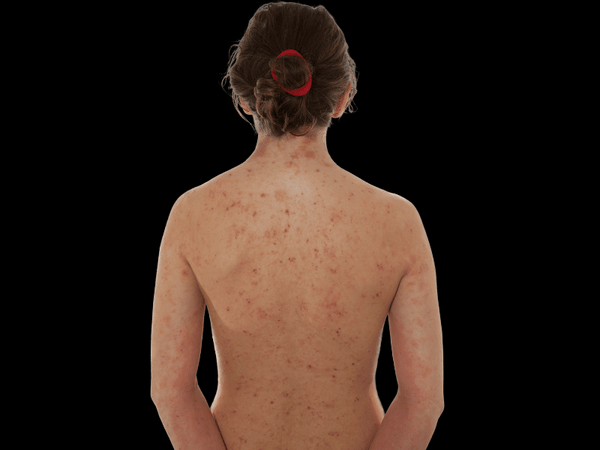
Atopic Dermatitis Medication
Atopic dermatitis (AD), commonly known as eczema, is a chronic skin condition characterized by dry, itchy, and inflamed skin. It affects millions of people worldwide and can significantly impact the quality of life.
Finding the right medication is crucial in managing this condition effectively. This comprehensive guide explores the various medications available for atopic dermatitis, including topical treatments, systemic medications, over-the-counter options, and alternative therapies like red light therapy.
By understanding the options and working closely with healthcare providers, individuals with AD can find relief and improve their own skin color and health.
Understanding Atopic Dermatitis

Atopic dermatitis (AD) is a complex skin condition that goes beyond mere mild eczema symptoms of skin dryness and irritation. It is a type of moderate-to-severe eczema, that often appears in infancy or early childhood but can persist into adulthood or even develop later in life. The hallmark symptoms of AD include:
-
Intense itching: is often the first and most distressing symptom, leading to scratching that can worsen the condition.
-
Red, inflamed skin: Affected areas may appear reddened and swollen.
-
Dry, scaly patches: The skin may be dry, flaky, and rough to the touch.
-
Cracked skin: Severe dryness can lead to cracks in the skin, which can be painful and increase the risk of infection.
AD is not just a skin disorder; it is closely linked to other atopic conditions such food allergies, medical conditions such as asthma and allergic rhinitis (hay fever). The exact cause of AD is not fully understood, but it is believed to involve a combination of genetic, environmental, and immune system factors.
Common triggers of AD flare-ups include:
-
Irritants: Such as soaps, detergents, and certain fabrics.
-
Allergens: Including pollen, pet dander, and dust mites.
-
Stress: Emotional stress can exacerbate symptoms.
-
Climate: Extreme temperatures and humidity levels can trigger or worsen AD.
-
Skin infections: Bacterial, viral, or fungal infections can aggravate the condition.
Managing AD involves identifying and avoiding triggers, maintaining a regular skincare routine, and using medication to control symptoms and prevent flare-ups. Understanding the nature and environmental triggers of this condition is the first step toward effective management.
Types of Atopic Dermatitis Medication
The treatment of atopic dermatitis (AD) is multifaceted and tailored to the severity and individual needs of the patient. Medications play a crucial role in managing symptoms and preventing flare-ups. Here's an overview of the main types of medications used to treat AD:
Topical Treatments

Corticosteroids:
-
Usage: These are the most commonly prescribed medications for AD. They reduce inflammation and relieve itching.
-
Benefits: Quick relief from symptoms, available in various strengths.
-
Side effects: Long-term use can lead to skin thinning, stretch marks, and other skin changes.
Calcineurin Inhibitors:
-
Usage: These medications (e.g., tacrolimus and pimecrolimus) are used when corticosteroids are not effective or for sensitive skin areas.
-
Benefits: Reduces inflammation and itching without the risk of skin thinning.
-
Risks: May increase the risk of skin infections and, rarely, certain types of cancer.
PDE4 Inhibitors:
-
Usage: A newer class of topical medication (e.g., crisaborole) that inhibits an enzyme involved in inflammation.
-
Benefits: Effective in reducing inflammation and itching with minimal side effects.
-
Considerations: May cause stinging or burning upon application.
Systemic Medications

Oral Corticosteroids:
-
Usage: Used for short-term management of severe AD flare-ups.
-
Precautions: Long-term use can lead to significant side effects, including bone loss, high blood pressure, and weight gain.
Biologics:
-
Usage: Dupilumab is a biologic medication approved for moderate-to-severe AD. It targets specific proteins involved in inflammation.
-
Benefits: Effective in reducing symptoms and improving quality of life.
-
Considerations: This requires regular injections and monitoring for side effects.
Traditional Systemic Immunosuppressants:

-
Usage: Medications like cyclosporine, methotrexate, and azathioprine are used when other treatments fail.
-
Benefits: Can be effective in controlling severe AD.
-
Risks: Potential for serious side effects, including kidney and liver damage, and increased risk of infections.
Over-the-Counter (OTC) Options

Moisturizers and Barrier Creams:
-
Role: Essential for maintaining skin hydration and barrier function.
-
Usage: Should be applied regularly, even when the skin is clear.
Antihistamines:
-
Efficacy: Can help relieve itching, especially if taken at night to aid sleep.
-
Considerations: Some types may cause drowsiness.
Alternative Therapies for Atopic Dermatitis
In addition to traditional medications, alternative therapies can play a supportive role in managing atopic dermatitis (AD). These treatments may complement conventional approaches, providing additional relief and improving overall skin health.
Red Light Therapy for Atopic Dermatitis
What is red-light therapy?
Red light treatment, sometimes referred to as photobiomodulation or low-level laser therapy (LLLT), is the application of low-intensity red or near-infrared light to the skin. It is thought that this non-invasive procedure will lessen inflammation and encourage recovery.
Potential Benefits for AD:
-
Reduces Inflammation: Red light therapy may help decrease the inflammatory response associated with AD, leading to reduced redness and swelling.
-
Enhances Skin Barrier: By stimulating collagen production, red light therapy can strengthen the skin barrier, making it more resilient to irritants and allergens.
-
Alleviates Itching: Some studies suggest that red light therapy can reduce the itchiness that is a hallmark of AD.
-
Safe for Long-Term Use: Unlike some medications, red light therapy does not have significant side effects, making it suitable for ongoing management of AD.
Incorporating Red Light Therapy into Your AD Management Plan:
-
Consult a Dermatologist: Before starting red light therapy, it's important to discuss it with your healthcare provider to ensure it's appropriate for your specific case.
-
Choose the Right Device: There are various red light therapy devices available, ranging from handheld units to larger panels. Select one that is FDA-approved and suits your needs.
-
Follow a regular schedule. Consistency is key. Follow the recommended treatment schedule, usually several times a week, to achieve the best results.
-
Monitor Your Skin's Response: Keep track of any changes in your symptoms and discuss them with your dermatologist.
Choosing the Right Medication for Your Atopic Dermatitis
Selecting the appropriate medication for treating atopic dermatitis, (AD) is a critical step in managing the condition effectively. Here are some key considerations to keep in mind when choosing a treatment:
1. Severity of Symptoms: The choice of medication will be greatly influenced by how severe your AD symptoms are. Topical drugs can be used to treat mild cases, whereas systemic medications or biologics may be necessary for more severe cases.
2. Age and Health Status: Certain medications may not be suitable for young children or individuals with specific health conditions. It's important to consider the patient's overall health and any potential contraindications.
3. Previous Treatment Response: If you've previously tried certain topical medications, without success, your dermatologist will likely explore alternative options.
4. Potential Side Effects: Every medication comes with the risk of side effects. Talk about these risks and the possible advantages of prescription medication with your healthcare provider.
5. Lifestyle and Preferences: Consider how the treatment fits into your daily routine. For example, some people may prefer a once-daily topical application, while others might be comfortable with regular injections.
6. Cost and Insurance Coverage: The cost of prescription medications, the prescription medication used, and insurance coverage can also be a deciding factor. Explore different options to find a treatment that is both effective and financially feasible.
The Role of a Dermatologist in Managing AD
A dermatologist is your first primary care provider and partner in managing atopic dermatitis. They can provide:
-
Expert Diagnosis: Accurate identification of the condition and its severity.
-
Personalized Treatment Plan: Tailored recommendations based on your unique needs.
-
Ongoing Monitoring: Regular check-ups to assess the effectiveness of the treatment and make adjustments as needed.
-
Education and Support: Guidance on skincare routines, trigger avoidance, and coping strategies.
Importance of a Personalized Treatment Plan
No two cases of AD are exactly alike. A personalized treatment plan ensures that your specific symptoms, triggers, and lifestyle are taken into account. This approach increases the likelihood of successful management and long-term control of the condition.
Tips for Managing Atopic Dermatitis Medication
Effectively managing atopic dermatitis (AD) involves more than just taking medication. Here are some tips to help you navigate the treatment process and maximize the benefits of your medication:
1. Adherence to Prescribed Regimens:
-
Follow your dermatologist's instructions carefully. Consistency is key to controlling symptoms and preventing flare-ups.
-
Set reminders or use a medication tracker app to help you remember when to apply or take your medication.
2. Monitoring for side effects:
-
Be aware of potential side effects associated with your medication. Report any unusual symptoms or reactions to your healthcare provider promptly.
-
Regular check-ups with your dermatologist are important for monitoring the effectiveness and safety of your treatment.
3. Lifestyle Changes to Complement Medication:
-
Moisturize Regularly: Use a fragrance-free, hypoallergenic moisturizer to keep your skin hydrated and protect the skin barrier.
-
Avoid Triggers: Identify and minimize exposure to triggers that can worsen your AD, such as certain fabrics, allergens, or stress.
-
Maintain a Healthy Diet: Some people find that certain foods can exacerbate their AD. Consider keeping a food diary to identify any potential dietary triggers.
4. Effective Skincare Routine:
-
Use gentle, non-irritating skincare products. Avoid products with harsh chemicals or fragrances.
-
Take short, lukewarm baths or showers, and pat your skin dry gently. Avoid rubbing, which can irritate the skin.
-
Apply moisturizer immediately after bathing to lock in moisture.
5. Educate yourself and seek support.
-
Stay informed about your condition and treatment options. Reliable sources include medical websites, patient advocacy groups, and your healthcare team.
-
Consider joining a support group for individuals with AD. Sharing experiences and tips with others who understand what you're going through can be comforting and helpful.
The Future of Atopic Dermatitis Treatment
Research into new medications and therapies for atopic dermatitis (AD) is ongoing, with clinical trials aimed at providing more effective and targeted treatments. Some of the promising developments in the field include:
1. Biologic Therapies: Biologic medications, such topical therapies or such topical steroids such as dupilumab, have revolutionized the treatment of moderate to severe AD. Continued research is focused on developing new biologics that target different aspects of the immune system and response involved in AD.
2. JAK Inhibitors: Janus kinase (JAK) inhibitors are a class of drugs that block the action of specific enzymes involved in the inflammatory process. Early studies suggest that JAK inhibitors may be effective in treating AD, particularly in cases that do not respond well to other therapies.
3. Topical JAK Inhibitors: Topical formulations of JAK inhibitors are also being investigated as a potential treatment for AD. These oral medications would offer a targeted approach to reducing inflammation in the skin.
4. Microbiome-based Therapies: Research has shown that the skin microbiome plays a role in the development of AD. Future treatments may include therapies that target the skin microbiome to restore balance and reduce inflammation.
5. Gene Therapy: Gene therapy aims to correct the underlying genetic defects that contribute to AD. While still in the early stages of development, gene therapy holds promise for providing long-lasting relief from AD symptoms.
6. Personalized Medicine: Advances in genetics and personalized medicine may lead to tailored treatment approaches based on an individual's genetic makeup and specific disease characteristics.
7. Digital Health Solutions: Technology-based solutions, such as smartphone apps and wearable devices, are being developed to help individuals with AD manage their condition more effectively. These tools can track and manage symptoms, monitor medication adherence, and provide education and support.
Frequently Asked Questions (FAQs) About Atopic Dermatitis Medication
Q: Can atopic dermatitis be cured with medication?
A: Atopic dermatitis is a chronic condition that cannot be cured, but it can be effectively managed with medication and lifestyle changes to control and relieve symptoms, and prevent flare-ups.
Q: How long does it take for medication to work for atopic dermatitis?
A: The time it takes for medication to work can vary depending on the individual and the severity of the condition. Some people may see improvement in a a few weeks or days, while others may take several weeks to respond to treatment.
Q: Are there allergic reactions? Are there any natural remedies or alternative treatments for moderate-to-severe atopic dermatitis yet?
A: Some people find relief from atopic dermatitis symptoms using natural remedies such as oatmeal baths, coconut oil, or certain herbal remedies. However, it's important to consult with a healthcare provider before trying any alternative treatments to ensure they are safe and effective.
Q: Can I stop taking my medication once my atopic dermatitis symptoms improve?
A: It's important to follow your dermatologist's instructions regarding medication use. Stopping medication abruptly can lead to a recurrence of symptoms. Your dermatologist will provide guidance on when and how to safely taper off medication, if appropriate.
Q: Are there any other treatments for the long-term side effects of atopic dermatitis medication?
A: Some medications used to treat atopic dermatitis, such as topical steroids such as, oral steroids, topical corticosteroids, and systemic immunosuppressants, can have potential long-term side effects. It's important to discuss the risks and benefits of long-term medication use with your healthcare provider.
Q: Can I use over-the-counter moisturizers instead of prescription creams for atopic dermatitis?
A: Over-the-counter moisturizers can be beneficial for managing atopic dermatitis, especially for dry skin, when used regularly to maintain skin hydration. However, in some cases, prescription creams or ointments may be necessary to control symptoms.
Q: How often should I see my dermatologist for atopic dermatitis treatment?
A: The frequency of dermatologist visits will depend on the severity of your condition and your response to treatment. In general, regular follow-up visits are recommended to monitor your progress and make any necessary adjustments to your treatment plan.
Q: Can stress worsen my atopic dermatitis symptoms?
A: Stress is known to be a trigger for atopic dermatitis flare-ups in some people. Managing stress through relaxation techniques, mindfulness, or therapy may help control inflammation and improve symptoms.
Q: Is it safe to use atopic dermatitis medication during pregnancy or while breastfeeding?
A: It's important to consult with your healthcare provider before using any medication for atopic dermatitis during pregnancy or while breastfeeding, as some medications may pose risks to the developing fetus or nursing infant.
Q: How can I prevent severe atopic dermatitis flare up get-ups?
A: Avoiding triggers such as harsh soaps, certain fabrics, and environmental allergens, maintaining a regular skincare routine, and managing stress can help prevent some moderate-to-severe atopic dermatitis flare-ups.
Conclusion
Atopic dermatitis (AD) is a chronic and complex skin condition that can have a significant impact on quality of life. Effective management requires a multifaceted approach, including medication, skincare, and lifestyle modifications. By working closely with a dermatologist and following a personalized treatment plan, individuals with AD can achieve better control over their symptoms and improve their overall skin health.
It's important for individuals with AD to stay informed about new treatment options and to advocate for their health. By taking an active role in their care and working collaboratively with healthcare providers, individuals with AD can find relief from symptoms and enjoy healthier skin.


